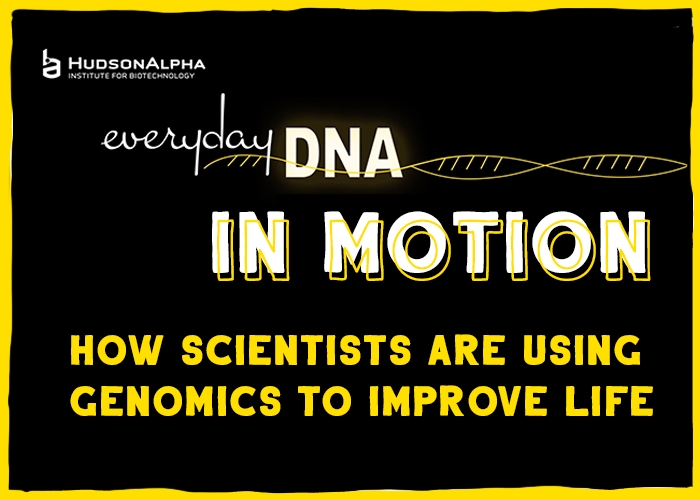When the HudsonAlpha Institute for Biotechnology opened its doors in 2008, founders Jim Hudson and Lonnie McMillian envisioned a place where scientists, entrepreneurs and educators would come together to solve some of the world’s most pressing health and agricultural issues. Ten years, 15 faculty, and 35 life sciences companies later, HudsonAlpha has helped to grow Alabama’s reputation as the biotech hub of the Southeast.
A Decade of Discovery
HudsonAlpha celebrated its ten-year anniversary this year and a “Decade of Discovery.” Under the direction of 15 faculty investigators, scientists have published more than 650 research papers; made discoveries in numerous areas including cancer, Alzheimer disease, ALS and agriculture; diagnosed close to 200 children with unexplained developmental delays; and opened the Smith Family Clinic for Genomic Medicine, the first stand alone genomics clinic.
In addition, the HudsonAlpha Genome Sequencing Center (HGSC) and the Genomic Services Lab (GSL) make the Institute a leader in genomic sequencing. To date, the HGSC has sequenced more than 110 organisms and the Genomic Services Lab (GSL) currently processes more than 400 terabytes of raw DNA sequence data each month.
“The impacts on our community, our state, and on genomics research and education worldwide have been tremendous,” said Rick Myers, PhD, HudsonAlpha President and Science Director.
Workforce development
HudsonAlpha is also working to train and inspire the next-generation of scientists and has impacted more than 5.5 million learners to date through internships, teacher training workshops, public seminars, and clinical training and digital downloads for educational games like iCell and Touching Triton.
“We’ve seen that Jim and Lonnie’s model is a success,” said Neil Lamb, PhD, vice president for Educational Outreach at HudsonAlpha. “When you put world-class scientists right next door to entrepreneurs that can turn ideas into products that impact humanity, and then blend education into the mix, amazing things happen.”
One program, in particular, is the BioTrain internship program, which gives Alabama college students the opportunity to gain hands-on experiences in HudsonAlpha research labs, administration and associate companies. To date, more than 280 interns, primarily from colleges and universities across Alabama, have participated in the program, with many going on to land positions at the Institute, as well as in bioscience organizations across the country.
Applications for the 2019 BioTrain internship will be open January 15 through February 15.
Innovation and collaboration
HudsonAlpha is home to 35 for-profit companies, which include one-person startups and international leaders in the life sciences industry. Bringing together entrepreneurs and researchers under one roof fosters a culture of collaboration and the rapid translation of discoveries to market.
For instance, associate company GeneCapture was awarded a two-year, $1 million Department of Defense contract to develop a desktop prototype to rapidly identify critical pathogens considered threatening to warfighters.
“It’s a completely new technique that would have been impossible without the advances in genetics and genomics discoveries of the last decade,” said Krishnan Chittur, PhD, chemical engineering professor emeritus at UAH and co-founder of GeneCapture. “That is one of the reasons we are located at the HudsonAlpha Institute for Biotechnology – the research that’s happening here is cutting-edge.”
With addition of the Paul Propst Center, a 100,000 square foot building located at 800 Hudson Way, HudsonAlpha can continue recruiting new companies and provide existing companies the opportunity to grow. In addition, HudsonAlpha offers a growing biotech hub to companies and start-ups by providing access to outside experts, marketing direction, and strategic networking opportunities with organizations such as BioAlabama, that aim to foster growth in the industry.
Economic impact
Since 2006, HudsonAlpha has contributed more than $1.85 billion in economic impact for the state of Alabama, according to a study conducted by the University of Alabama in Huntsville (UAH). The study reflects the impact of the entire biotech campus, combining economic data and impact from the nonprofit HudsonAlpha as well as 35 resident associate companies.
“HudsonAlpha and the associate companies have over 750 people on campus today. We are a key driver in this important North Alabama economic sector, but there are over 2,000 additional people working in the life sciences in Madison County alone,” said Carter Wells, HudsonAlpha vice president for economic development. “The findings from this study have re-energized all of us to keep focused on entrepreneurship, recruitment and business expansion as we continue to build a vibrant life sciences hub.”
What started as an idea has blossomed into a leading genomics research institute where scientists, educators and entrepreneurs work together to spark scientific discoveries, bring genomic medicine into clinical care; foster life sciences entrepreneurship; and inspire the future STEM workforce.
“Lonnie and I wanted to make biotechnology a permanent fixture in economic development in the state and everything that we dreamed of has come true,” said Jim Hudson, co-founder of HudsonAlpha. “It truly has been a decade of discovery and I look forward to seeing what we accomplish in the next decade.”


